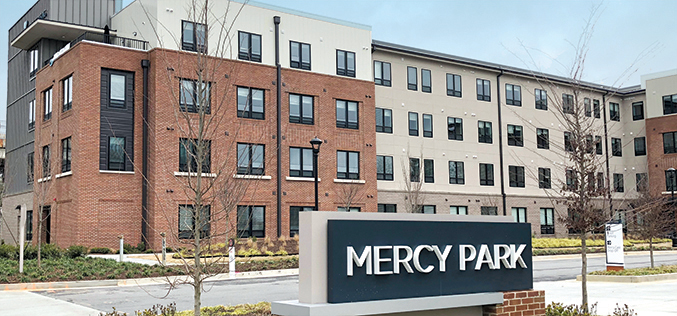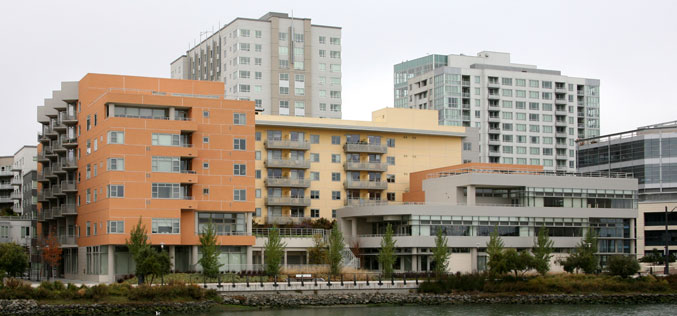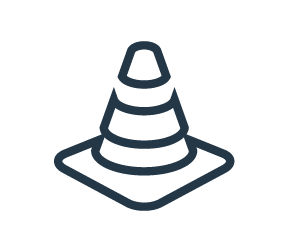Health and Wellness
Problems in housing can lead to problems in health, and vice versa. In order to break the cycle of poverty, people need a home and the tools to manage their health.
- If you are homeless and have diabetes, how are you supposed to refrigerate your insulin?
- If you have an unexpected, expensive medical bill, but only make $7.25 an hour, how are you supposed to pay your rent?
- If you don’t have a car, work two jobs, and can’t afford a place near public transportation, how are you supposed to get your children to their wellness visits when the doctor’s office is open?
The above questions are just a few examples of how health and housing influence each other.
Living Healthier Lives
We address hunger by providing onsite food pantries where we provide healthy foods to our residents. To help Mercy Housing residents live healthier lives, we offer a range of health and wellness services. Fitness classes and physical activity programs invigorate the body and mind. Cooking classes teach how to shop on a budget and prepare healthy meals. Free health screenings help residents manage their health. And at many of our properties, Mercy Housing staff help residents sign up for health insurance and navigate the complex health care system. These and other services are all offered onsite.
Helping Seniors Stay Healthy
In Phoenix, AZ, our senior residents are taking charge of their health by enrolling in Mercy Housing’s Chronic Disease Self-Management (CDSM) and Matter of Balance (MOB) programs!
The CDSM program helps improve residents’ health literacy by covering several health-related topics, including how to deal with difficult emotions, manage the symptoms of their conditions, set goals, solve problems, understand medication labels, make informed medical decisions, and more! Around 40% of our residents are at risk of falling. The MOB program helps seniors increase strength and balance through exercise.
Housing and Healthcare Partnerships
Our success co-locating affordable housing and healthcare depends on the strength of partnerships. Since Mercy Housing’s founding, we have pursued real estate opportunities that help the health of residents. Evidence shows that stable housing improves health outcomes and prevents unnecessary, high-cost, institutional-based medical care. We work closely with healthcare providers to deliver essential resources through our Resident Services programming. With major healthcare systems, we provide enhanced services to contribute to the well-being and health of thousands of residents in the communities we serve. Preventative health and wellness programming and our strategic healthcare partnerships have played a major role in our success.
Co-locating Models:
- Federally Qualified Health Center (FQHC): Developed six clinics either co-located in the housing or on land adjacent that serves the community as well as Mercy Housing residents
- Adaptive Re-Use of Hospital Property: Redeveloped obsolete buildings on healthcare campuses to provide affordable housing in San Francisco and Oxnard, CA
- Adult Day Health and Senior Centers: Developed four co-located centers for seniors in properties across the country to providing services to residents and the community
- Dedicated space for visiting clinic support: In many properties Mercy Housing builds specific space for visiting healthcare workers to offer onsite services including wellness and preventative care
Case Study: Senior Residences at Mercy Park

Senior Residences at Mercy Park in Chamblee, GA offers 79 affordable homes. It is adjacent to Mercy Care, a Federally Qualified Health Center and is a member of Saint Joseph’s Health System and Trinity Health. Residents live within walking distance to adult and pediatric primary care, including mental health and dental services. Located less than two blocks from the Chamblee MARTA station, residents and their families stay connected to the neighborhood and the area’s resources.
Case Study: Mission Creek Senior Community

Mission Creek Senior Community is a collaboration with the San Francisco Redevelopment Agency, the San Francisco Department of Public Health, and the San Francisco Public Library. The community serves very-low-income seniors. Mission Creek has won 13 design awards and recognitions. This community offers 140 affordable homes with an Adult Day Health Center, and access to a branch of the San Francisco Public Library. Mission Creek is located along a creek with walking trails and is close to public transit.
 Impacts
Impacts
At our communities with Resident Services, among those who responded to our survey:
- 90% of senior residents and 75% of all residents reported having a primary care provider.
- 97% of residents reported having health insurance.
- 94% of senior residents reported having had a checkup in the previous year.
- Residents reported that they exercised an average of 4 days a week.
 Challenges Facing Residents:
Challenges Facing Residents:
- Limited access to healthy food
- Difficulty accessing and navigating healthcare system
- Difficulty obtaining high-quality health care
- Limited access to preventive care
- Limited access to resources related to staying healthy
- Few opportunities/places to exercise

Opportunities Offered at Mercy Housing Communities
- Food banks and pantries with healthy food options
- Help obtain health insurance, preventive screenings, and access health care
- Wellness workshops on how to manage chronic diseases and improve health
Pursing Health with Others – Carla’s Story
For Carla, a resident at the Miriam Apartments in Chicago, exercise and healthy eating aren’t short-term objectives; they’re a way of life. She is a stroke, heart attack, and two-time cancer survivor who understands how exercise and healthy eating can improve a person’s quality of life.
“I know the right kinds of food and the wrong kinds of food. I know what makes me feel good and what makes me feel bad. I want to feel good,” she said.
Carla participated in a “Feel Better Challenge,” an annual eight-week fitness and healthy lifestyle program held in our Chicago region. She didn’t limit herself to the special Feel Better programs and activities available at her community; she also took advantage of programs being offered at Mercy Housing properties around the city, like group exercise classes, therapeutic arts and crafts sessions, meditation, and yoga.
She was also a source of inspiration and motivation to other women in the building. “I used to go knocking on doors to get people walking. Now the ladies come to find me,” said Carla.
What’s more, Carla was one of two residents recently accepted into a leadership program for GirlTrek, a national nonprofit that mobilizes African-American women to live their healthiest, most fulfilled lives through daily walking.
Resources
- Innovative Models in Health and Housing — 2017 Report
- Impact of Service-Enriched Housing on Health Outcomes – May 2014 results of resident services survey
- Health in Residence: Exploring Housing as a platform for addressing health needs – a joint report by Mercy Housing and The Colorado Coalition for the Medically Underserved
- Afterschool KidzLit Pilot – 2013-2014 Final Report


